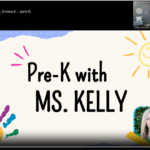
Future of online learning: How it’s shaping the K-12 experience
In the wake of the COVID-19 pandemic, online learning became a lifeline for students and families, but now that we’re moving beyond the crisis, what does the future of online learning look like? For many parents, the shift to virtual classrooms was a challenging adjustment, but it opened up new opportunities to reconsider how education could work for their children. Whether you’re a parent who already has explored online schooling or one who’s considering it, understanding the future of online learning is crucial for making informed decisions about your child’s education.
The pandemic might have been the catalyst, but online learning for K-12 students is here to stay. In fact, many educational experts believe that this shift represents the future of schooling. Let’s explore what lies ahead in the world of K-12 online education and how it can continue to benefit your child now that the pandemic has passed.
The Future of Online Learning
A Flexible Learning Experience
One of the key advantages of online education for K-12 students is its flexibility. Whether it’s due to health concerns, geographical limitations or the desire to customize the pace of their learning, online schooling allows children to learn in an environment that works best for them. This flexibility is one of the main reasons why online learning for K-12 students has thrived beyond the pandemic.
Parents who were hesitant about online schooling before are now more open to the idea because of the benefits it offers. With access to virtual classrooms and digital tools, students can manage their time more effectively, learn at their own pace and access resources that might not be available in traditional brick-and-mortar schools. For families, this can mean fewer stressors such as rushing to make it to school on time or struggling to keep up with a traditional classroom pace.
Personalized Learning and Innovation
The future of online learning isn’t just about attending class in a virtual setting; it’s also about the personalization of learning. With advancements in educational technology, online platforms can offer tailored learning experiences to students, adapting lessons based on their unique strengths and areas of need.
For example, some online schools use artificial intelligence to assess a student’s learning patterns and adjust lessons accordingly, ensuring they’re working at a comfortable but challenging pace. This level of personalization can be hard to achieve in a traditional classroom, where teachers must divide their attention among many students with different needs.
In addition to adaptive learning technologies, online education can provide students with access to a wide variety of courses that go beyond the core subjects. From coding to digital art and foreign languages to STEM, students can explore subjects they might not have had the opportunity to pursue in a traditional setting. This opens new pathways for young learners, helping them discover their passions early on.
Increased Access to High-Quality Resources
Online education has a unique ability to level the playing field, providing access to high-quality educational resources that previously were out of reach for many families. Whether it’s through virtual textbooks, interactive learning modules or real-time tutoring sessions, students can benefit from tools and materials that can enhance their educational experience.
Parents also can choose from a wider range of educational programs. Whether you’re looking for a full-time online school or supplementary online learning tools, there are many options available. For parents of children who need more support or a specialized learning environment, there are online programs designed to cater to students with disabilities or those who are at risk of falling behind in traditional settings.
Socialization and Online Communities
A common concern parents have about online schooling is the potential for their children to miss out on social interactions with peers. However, the future of online education is addressing this concern by incorporating more interactive and community-building opportunities. Many online programs are integrating virtual clubs, team-based projects and even online field trips to ensure that students have opportunities to socialize and build relationships.
Moreover, online schooling doesn’t just connect students with other kids in their local area; it opens opportunities for global connections. Students can interact with peers from different cultures, broadening their understanding of the world around them. This kind of socialization fosters valuable skills such as communication, collaboration and global awareness, which are essential in today’s interconnected world.
The Growing Role of Parents in Education
The future of online learning isn’t just about what students experience in the classroom—it’s also about how parents are becoming more involved in their children’s education. With online schooling, parents have more visibility into their child’s progress, assignments and learning outcomes. Many online platforms provide real-time access to performance metrics, which can help parents make informed decisions about how to best support their child’s academic journey.
In addition, parents have more opportunities to engage in their child’s learning process. From participating in virtual parent-teacher conferences to helping children access learning materials, online schooling offers new ways for parents to take an active role in their child’s education.
Long-Term Benefits for the Future
Looking to the future, online education will continue to evolve, providing long-term benefits for both students and families. The ability to tailor a child’s educational experience to his specific needs and interests can lead to more engaged and motivated learners. As technology continues to advance, the online learning experience will only become more immersive and interactive, offering students even more opportunities for growth.
Furthermore, online schooling can help students develop important skills that are valuable in the digital age, including time management, self-discipline and technological literacy. These skills will prepare them not just for academic success, but for success in the workforce and beyond.
Embrace the Future of Online Learning
The future of online learning is bright. As we move beyond the pandemic, online education for K-12 students is here to stay and will continue to offer valuable opportunities for both students and parents. From flexibility and personalized learning to increased access to resources and opportunities for socialization, online schooling provides a wealth of benefits that traditional classrooms simply can’t match.
As a parent, it’s essential to stay informed and explore all the options available to ensure your child’s education is the best it can be.
The future of online learning is an exciting one, and The Classroom Press is here to help guide you through this new era of education. Explore our resources today to learn more about how online learning can benefit your family.

















